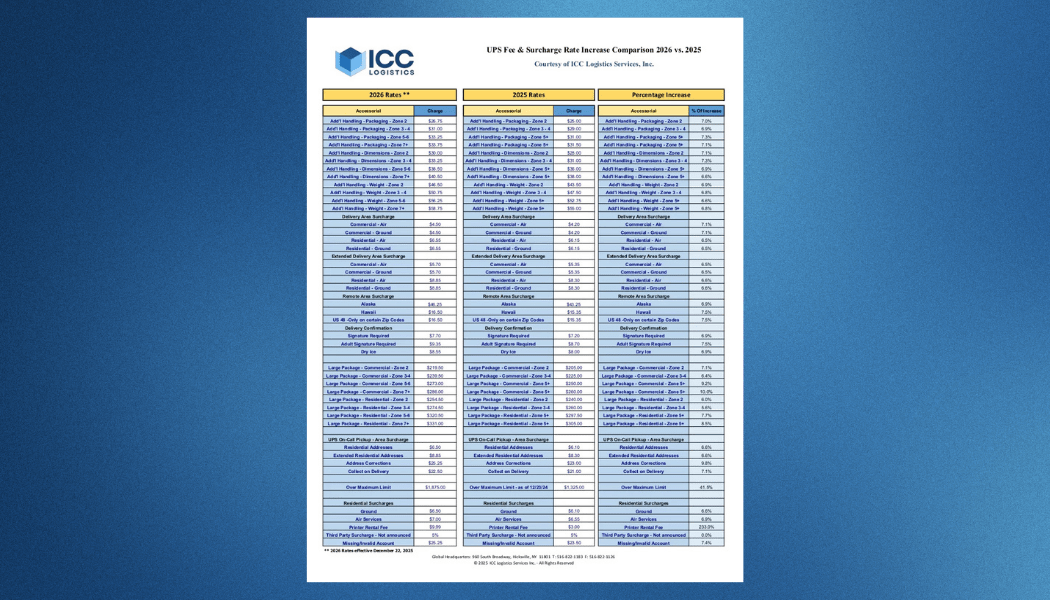Delicate, oversized, or irregular freight often appears fine on the quote, but then the invoice arrives. That’s where the real story is. Extra fees, system-generated surcharges, or vague line items can start to stack up quickly, especially for high-value shipments such as medical devices, furniture, machinery, or any item that requires special care.
ICC sees these charges every day. Most of them don’t look like much on their own, but when you ship at scale, they quietly drain budget. Here are the five hidden fees that show up most often and what you can do to stop paying for them.
Why These Shipments Attract Extra Fees
Oversized and fragile freight demands more handling, more time, and more liability from carriers. That part is real.
What isn’t always clear is when these charges should apply, how carriers calculate them, or why they vary so much from one shipment to another.
- Some accessorials trigger because of dimensions.
- Some triggers are based on ZIP code logic.
- Some triggers are because a carrier’s system assumes something that isn’t true.
Without regular audits and contract checks, these small add-ons turn into predictable overspending.
A good freight audit brings those patterns to the surface, so you can challenge the bad charges, correct the repetitive ones, and prevent the rest.
Without regular audits and contract checks, these small add-ons turn into predictable overspending.
A good freight audit brings those patterns to the surface, so you can challenge the bad charges, correct the repetitive ones, and prevent the rest.
Additional Handling / Manual Handling Fees
This is one of the most common and most inconsistent charges for delicate freight.
Carriers apply it when:
- Packaging isn’t standard
- The freight can’t be stacked
- The item is irregularly shaped
- Staff have to handle it manually
Here’s the problem:
Invoices rarely explain why the charge applies. We regularly find duplicates or charges with no documentation at all.
What helps:
Understand your carrier’s exact criteria and document any exceptions in advance. This alone eliminates a big chunk of unnecessary fees.
Oversize Surcharges
If your freight goes one inch over a carrier’s limit—96″, 108″, 120″, depending on mode – you’re paying a premium.
These fees can jump dramatically with each size bracket.
Common issues ICC finds:
- Incorrect dimensions used to trigger the fee
- Rules misapplied based on the wrong mode
- Carriers using estimates instead of actual measurements
Real example:
A machinery distributor cut annual spend by 12% by redesigning packaging to fall just under the threshold.
Small change. Big impact.
Residential & Limited-Access Delivery Fees
These are some of the most misapplied charges in all of logistics.
Carriers often auto-classify addresses as residential or limited access based on ZIP code – not reality. Retail stores, medical offices, and commercial facilities get flagged incorrectly all the time.
In one ICC audit, a national retailer learned that 18% of shipments were incorrectly billed as residential. Read more case studies here.
How to avoid:
Validate addresses before tendering the shipment and document exceptions in your TMS.
Liftgate & Inside Delivery Fees
Heavy and oversized items often require specialized unloading equipment. When requested, these fees are legitimate.
The issue:
They often appear automatically, or get added after delivery, without proof that the service was actually performed.
One quick fix:
Make sure delivery requirements are documented at quoting and tendering. It cuts down on surprise charges dramatically.
Reclassification & Dim Weight Errors
DIM mistakes and incorrect freight classes are some of the most expensive errors for fragile or bulky shipments.
Common causes:
- Outdated NMFC codes
- Inconsistent rounding
- Wrong dimensional weight formula
- System-estimated dimensions that don’t match reality
These errors often go unnoticed unless you measure and verify regularly.
Savings are real:
Routine DIM audits often uncover tens of thousands in annual reductions.
How To Catch These Fees Before You Pay Them
A few simple habits prevent most surprises:
- Review contracts to make sure size and weight thresholds match current carrier rules.
- Audit invoices automatically to catch duplicate or out-of-range surcharges.
- Document everything: special handling, exceptions, and accessorial approvals.
- Train teams so logistics, procurement, and AP understand what triggers these fees.
Benchmark with a third-party expert to spot overbilling trends across modes and carriers.
Turn Audit Findings Into Cost Prevention
Overcharges aren’t random; they’re patterns. A freight audit exposes those patterns so you can fix the root cause.
ICC’s audits often reveal:
- Packaging that triggers unnecessary fees
- Recurring address misclassifications
- Inconsistent DIM logic across carriers
- Accessorials tied to outdated facility info
Default settings in TMS or carrier portals that inflate cost
When these insights feed back into operations, companies see noticeable improvements within a quarter.
Common Oversized/Fragile Freight Overcharges We See
- Duplicate manual handling charges
- Limited-access fees applied to normal commercial sites
- Liftgate surcharges tied to outdated facility data
- DIM weight errors that inflate cost
Every one of these resulted in real refunds and better contract protection for ICC clients.
FAQ
What hidden fees show up the most?
Additional handling, overlength, limited-access, liftgate, and reclassification charges.
How much can these accessorials add to a freight bill?
Often 10–30% — sometimes more if DIM weight is miscalculated.
Why do delicate or oversized shipments get so many mischarges?
They have exceptions in handling and packaging, which creates more room for system errors.
Can these overcharges actually be recovered?
Yes. A detailed audit can document and dispute each one.
What should I look for on my invoices?
Recurring accessorials, undefined codes, or sudden DIM weight changes. Anything vague should be questioned.
Hidden charges on delicate or oversized freight aren’t small—they multiply quickly and hit budgets hard. Continuous auditing keeps these fees in check and makes sure every charge on your invoice is accurate, documented, and justified.
With ICC’s Freight Invoice Audit Services, shippers get full visibility, recover unnecessary spend, and strengthen their carrier agreements for the long term.



 to receive our FREE white papers:
to receive our FREE white papers: